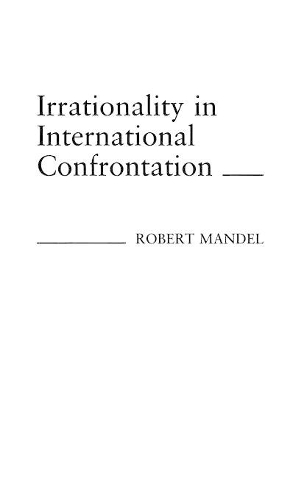
Irrationality in International Confrontation.
(Hardback)
Publishing Details
Irrationality in International Confrontation.
By (Author) Robert Mandel
Bloomsbury Publishing PLC
Praeger Publishers Inc
4th August 1987
United States
Classifications
Tertiary Education
Non Fiction
Political science and theory
327.101
Physical Properties
Hardback
162
Description
The first book to explore systematically and comprehensively the influence and utility of irrationality in international relations, this study begins with an intensive exploration of the nature of irrationality. The author proceeds to examine twelve case studies in which irrationality has figured prominently in international confrontations. Among these conflicts are featured the Poland Solidarity crisis, the Soviet natural gas pipleline controversy, American invlovement in Nicaragua, the Grenada invasion, the Iranian seizure of American hostages, the Iran-Iraq war, the Libyan embassy incident, and the Falkland Islands war, among others. Finally, the work assesses patterns which emerge throughout the case studies and generates policy perceptions for applying or resisting irrationality, suggesting as well, the global consequences of proliferating irrationality in the international political arena.
Reviews
The purpose of [the book] is to take a first step in showing when, how, and why irrationality can be more or less effective as a policy foundation in international confrontations.' Using four dimensions of irrationality, twelve case studies of irrationality in foreign policy in the 1980s are examined, under two main headings: stick-in-the-mud' irrationality and daredevil' irrationality. Six are rated as successes' and six as failures.' The author frankly admits that it is relatively difficult to make across-the-board distinctions between rational and irrational states.' The four chapters of case studies are preceded by two on the nature of irrationality and on methodology, and are followed by two presenting a comparative evaluation of the case study findings and some comments on policy implications. The concept of irrationality is a central theme is psychoanalysis and has frequently been applied to foreign policy behavior.... Mandel's volume should be of interest to anyone who wishes to investigate this dimension of international relations. Upper-division and graduate students and general readers.-Choice
"The purpose of the book is to take a first step in showing when, how, and why irrationality can be more or less effective as a policy foundation in international confrontations.' Using four dimensions of irrationality, twelve case studies of irrationality in foreign policy in the 1980s are examined, under two main headings: stick-in-the-mud' irrationality and daredevil' irrationality. Six are rated as successes' and six as failures.' The author frankly admits that it is relatively difficult to make across-the-board distinctions between rational and irrational states.' The four chapters of case studies are preceded by two on the nature of irrationality and on methodology, and are followed by two presenting a comparative evaluation of the case study findings and some comments on policy implications. The concept of irrationality is a central theme is psychoanalysis and has frequently been applied to foreign policy behavior.... Mandel's volume should be of interest to anyone who wishes to investigate this dimension of international relations. Upper-division and graduate students and general readers."-Choice
"The purpose of [the book] is to take a first step in showing when, how, and why irrationality can be more or less effective as a policy foundation in international confrontations.' Using four dimensions of irrationality, twelve case studies of irrationality in foreign policy in the 1980s are examined, under two main headings: stick-in-the-mud' irrationality and daredevil' irrationality. Six are rated as successes' and six as failures.' The author frankly admits that it is relatively difficult to make across-the-board distinctions between rational and irrational states.' The four chapters of case studies are preceded by two on the nature of irrationality and on methodology, and are followed by two presenting a comparative evaluation of the case study findings and some comments on policy implications. The concept of irrationality is a central theme is psychoanalysis and has frequently been applied to foreign policy behavior.... Mandel's volume should be of interest to anyone who wishes to investigate this dimension of international relations. Upper-division and graduate students and general readers."-Choice
Author Bio
ROBERT MANDEL is Professor of International Affairs at Lewis and Clark College in Portland, Oregon.
